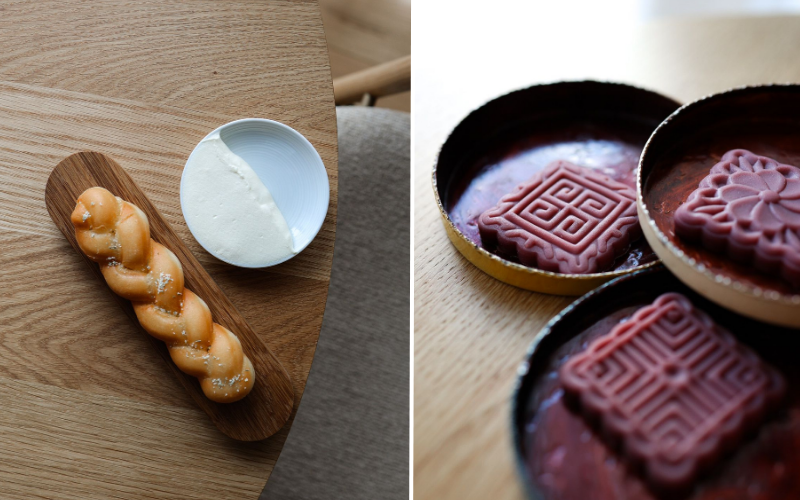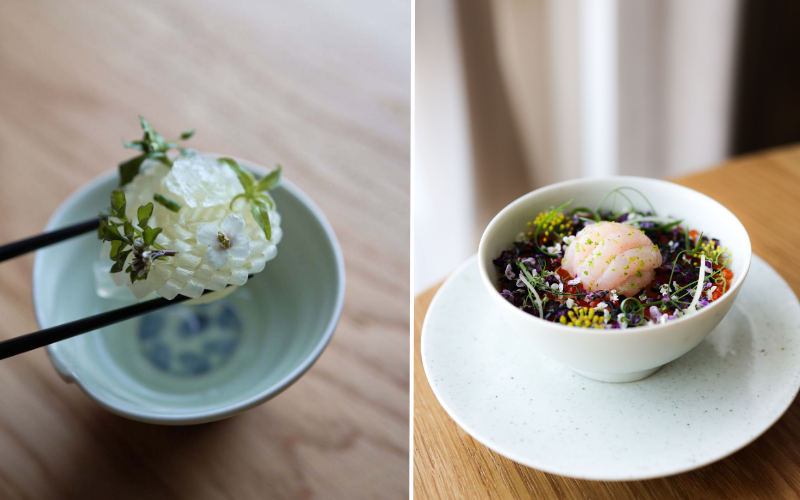- 한국어
- English
- 日本語
- 中文
- العربية
- Español
- Français
- Deutsch
- Pусский
- Tiếng Việt
- Indonesian
By Honorary Reporter Foteini Chatzoudi from Greece
Photos = Neve Qaraday
Kristian Baumann, a chef born in Korea and raised by his adoptive family in Denmark, is famous for his unique blend of Korean and Nordic cuisine.
In 2016, he opened the restaurant 108, which received a Michelin star the next year. He later spent time in Korea reconnecting with his motherland before opening Koan, which he launched as a pop-up business, in 2023.
He is the owner and head chef of Koan, which earned two Michelin stars just 10 weeks after its opening.
The following are excerpts from an email interview with Baumann from Feb. 27 to March 18.

Two of the chef's creations are kkwabaegi (left), a twisted doughnut served with salted whipped double cream, and chewy cherry rice cakes with preserved raspberries.
Briefly describe your culinary journey and your philosophy behind Koan.
Growing up in a traditional Danish home while staying connected to my Korean heritage through cultural events and gatherings shaped my early culinary experiences. My passion for cooking emerged during boarding school, leading me to work at prestigious kitchens across France and Copenhagen. The name Koan, derived from seon (Zen) Buddhism, reflects our philosophy of keeping an open mind and exploring endless possibilities in combining Korean and Danish flavors.
How has your exploration of Korean cuisine influenced your culinary style?
Throughout my travels to Korea, I explored various restaurants, frequented numerous street vendors, visited temples and even went to the orphanage where I was adopted. A particularly transformative experience was meeting the Ven. Jeong Kwan at the Buddhist temple of Baegyangsa, where we foraged together and discussed life. Her teachings continue to influence our dishes at Koan.

Baumann's white kimchi (left) has aromatic herbs and elderflower oil and seafood bibimbap, or spicy rice mixed with meat and vegetables, featuring gamasot (traditional cauldron pot) rice topped with kelp-cured squid.
Explain your signature dish and your approach to fusion cuisine.
Our signature white kimchi dish embodies our philosophy perfectly. It exemplifies how we bridge Korean and Danish cultures, creating unexpected combinations while respecting both traditions.
When it comes to combining these culinary traditions, we maintain an experimental approach. Most fascinating is how our Korean and Danish guests recognize familiar flavors while discovering new combinations, creating a truly unique dining experience.
What is your favorite ingredient?
Wild rosehip is one of my favorite ingredients, representing the unexpected connections between the two cuisines. Found both in Denmark and at Baegyangsa, it offers versatile uses from its flowers to its seeds, which produce oil similar to sesame oil.
What are your plans?
I aim to maintain a beginner's mindset and continue creating while helping the next generation achieve their culinary goals. Success for me isn't about accolades, but about making a lasting impact on the culinary world and its future leaders.
msjeon22@korea.kr
*This article is written by a Korea.net Honorary Reporter. Our group of Honorary Reporters are from all around the world, and they share with Korea.net their love and passion for all things Korean.